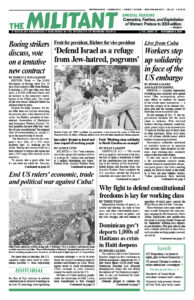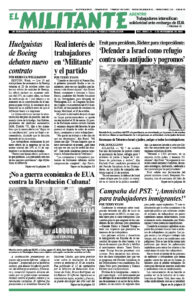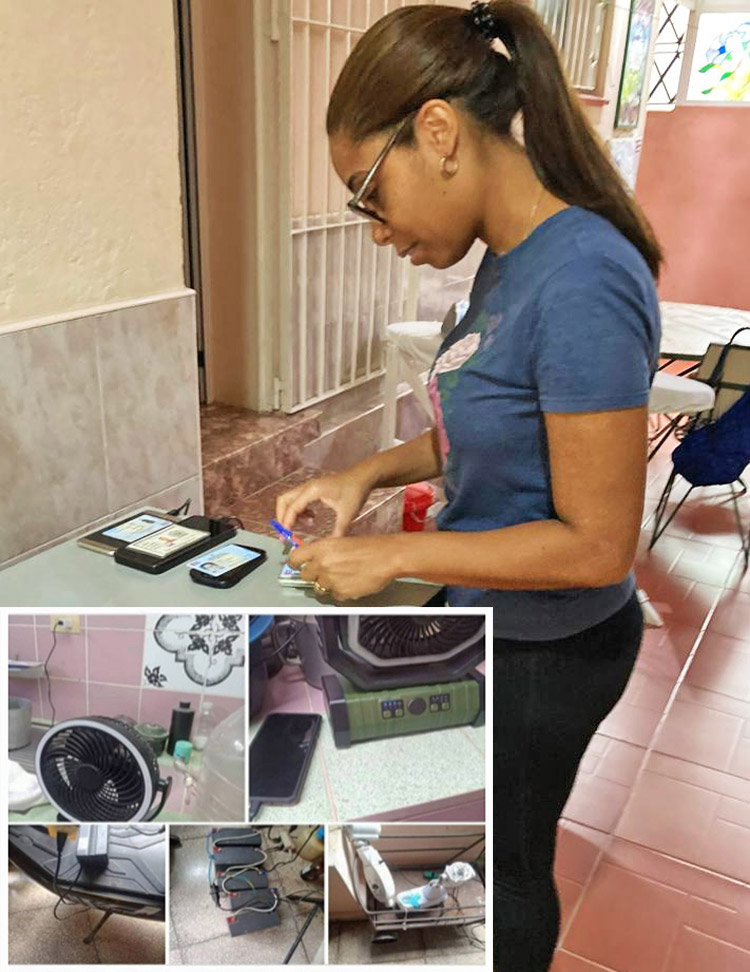HAVANA — Countless expressions of working-class solidarity have spread across Cuba, accompanying government efforts to confront the impact of two recent major emergencies — a three-day collapse of the national electrical grid and the damage caused by Hurricane Oscar in eastern Cuba.
On the evening of Oct. 17, the unprecedented blackout left the entire island in darkness. With electrical workers laboring intensely round-the-clock, power began to be restored after 72 hours in Havana and 24 hours later in other provinces. Many local areas are still without reliable power, which workers are pressing to restore.
Government authorities mobilized all available resources to maintain vital services, from hospitals to bakeries. And working-class solidarity came to the fore everywhere.
If your only source of information is the international capitalist media, whether liberal or conservative, the picture you’re given is that Cuba’s working people are about to throw in the towel, or, at best, are poor helpless victims. “Cuban government faces backlash amid massive blackout” was a typical headline, this one in the French daily Le Monde.
Militant reporters in Havana found a very different response among working people, even in face of the hardships and frustrations, largely a product of Washington’s 60-plus year economic war on Cuba’s socialist revolution.
Evelina Cardet, a retired teacher in Holguín, in eastern Cuba, sent the Militant a sampling of half a dozen text messages circulating among neighbors and friends offering each other solidarity and support.
“We have electricity — anyone who needs to charge their phone or lamps, we’re here, ready to help each other,” was the message from Dania Murciano in Holguín.
“Hello, if anyone needs to put something in the fridge, or even share a coffee, don’t hesitate to just come over,” said Frank Padrón.
“In one hour, for anyone who isn’t able to cook, we’re offering free helpings of spaghetti right next to the church,” wrote Egner Leyva in the town of Banes, Holguín province. “It’s time for all of us to come together.”
In the Vedado neighborhood of Havana, Militant reporters visited a home that ran a power generator a few hours each day of the blackout, inviting neighbors to come and charge their devices there. A constant stream of people came.
The workers at Casa Vera, a bed and breakfast that caters to international students, distributed free coffee on the sidewalk one morning. Giving priority to the elderly living alone, these workers also put out a huge pot of caldosa, a hearty soup traditionally served in Cuba for community festivities. “I always take pride in what I cook,” said Alberto Castillo, the cook at Casa Vera. “But I put much more love into this caldosa.”
Similar initiatives were taken by individuals as well as state-owned and small private restaurants, who prepared meals for those in need.
In response to Hurricane Oscar, which caused major flooding in the eastern province of Guantánamo, the revolutionary government carried out well-planned evacuations of thousands of people to safer ground. Cuba’s mass organizations, from the trade unions to the Union of Young Communists, called on their members to join brigades to help residents clear debris and rebuild from hurricane damage.
The prolonged blackout came just weeks after hundreds of thousands of Havana residents were without water for several days when the system’s turbines crashed due to aging infrastructure and lack of resources for ongoing maintenance, a product of Washington’s punishing embargo. This accumulation of acute difficulties and challenges leads many, including among supporters of Cuba’s socialist course, to express frustrations about bureaucratic red tape or aspects of how the crisis has been handled. The U.S. capitalist rulers and other opponents of the revolution never stop trying to play on these pressures to foster discontent toward the government.
The U.S. imperialist rulers have waged an unrelenting economic and political war to try to undermine and overthrow the Cuban government. A summary of this assault, “Cuba: ‘End Washington’s economic, trade war against our revolution!’” was run in the last issue of the Militant, which is available at themilitant.com.
Oppose Washington’s economic war
Efforts to recover from the blackout and hurricane are “a major task given the economic and financial conditions the country is living through due to the tightened blockade against Cuba and the inclusion of our country on the State Sponsors of Terrorism List,” Cuban President Miguel Díaz-Canel said in an Oct. 21 national address.
By putting Cuba on this outrageous list, Washington threatens sharp sanctions on companies and banks around the world that trade with or facilitate credit to Cuba. This drastically restricts Cuba’s ability to purchase food, medical supplies, fuel, equipment and spare parts, magnifying shortages of basic goods and crippling transportation and other services.
The U.S. rulers, however, continue to underestimate the capacities of Cuba’s working people. Cardet, the retired Holguín teacher and staunch partisan of the revolution mentioned earlier, pointed with pride to a message circulated by one of her former students.
“I suffer the effects of the blackouts like anyone else,” he said. “But you know, I don’t feel like blaming Díaz-Canel or the government. I don’t feel like banging pots in the street,” as opponents of the revolution urge Cubans to do. “In any case, I would bang a pot to demand the blockade be lifted and that we be removed from the list that prevents Cuba from obtaining hard currency.
“In short, I don’t feel like ceasing to believe in the people who go out every day — despite the blackout — to teach, to cure patients, to produce.”


